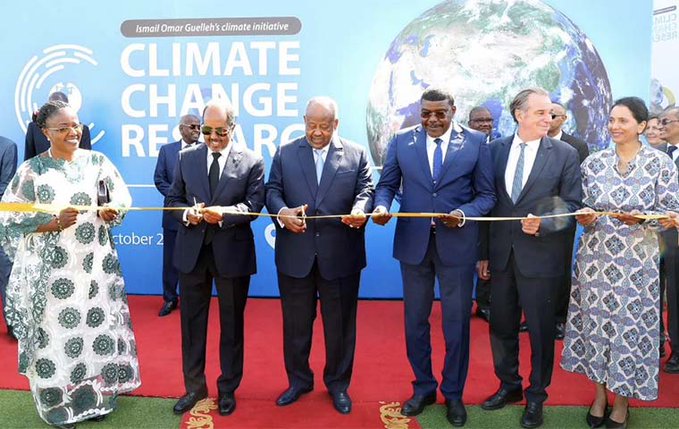|
Getting your Trinity Audio player ready...
|
The Regional Research Observatory on the Environment and Climate (RROEC) has been inaugurated in Djibouti in a bid to produce data and climate models to inform political decisions on climate adaptation and resilience for the country and across the East African region.
Established with the assistance of the International Atomic Energy Agency (IAEA), RROEC was instated at an international summit in Djibouti from 23-25 October 2022. Scientists, students, researchers and decision-makers from Comoros, Ethiopia, Rwanda, Somalia, Sudan and Uganda in the East African region discussed regional environmental and climate issues.
The theme of the summit was ‘Climate Change and Research (2CR): The path toward adaptation and lasting resilience’. 2CR is part of the COP27 perspective – the 27th session of the Conference of the Parties to the UN Framework Convention on Climate Change 2022 that will take place in the Red Sea city of Sharm el-Sheikh, South Sinai, from 7-18 November 2022.
Population vulnerable to climate change
“Thanks to the IAEA and other partners, this observatory became a reality – we are able to put in place reliable and operational models for climate change adaptation and lasting resilience,” the President of Djibouti and head of the government, Ismaïl Omar Guelleh, said during the RROEC opening ceremony on 23 October 2022, according to an article on the IAEA website.
According to the Climate Change Knowledge Portal, Djibouti, which is located on the Horn of Africa and bordered by the Red Sea, is facing water scarcity due to low levels of precipitation, higher temperatures, increased aridity, and rising sea levels. These challenges are expected to continue to affect the country, making its population of one million highly vulnerable to climate change.
RROEC will help Djibouti to better manage water and food resources threatened by global warming. RROEC will use nuclear and related techniques to produce data and climate models as well as mapping tools governments and aid agencies can use to help manage and prevent water or other environmental crises.
Best practices in region to be tracked
The observatory also aims to act as an essential scientific tool at the service of the East African region in terms of monitoring the climate, its impacts and conflict prevention. East Africa is known for its arid to semi-arid conditions and extreme interannual rainfall variations conducive to protracted droughts and occasional devastating floods, according to a 2022 report titled Climate risk report for the East Africa region.
Professor Adipala Ekwamu, executive secretary of the Regional Universities Forum for Capacity Building in Agriculture (RUFORUM) in Uganda, welcomed the news of the official RROEC inauguration.
“RROEC will help to track climate change research and best practices in the East African region and identify areas which need more research as well as developing policy documents and design along with implementing both adaptation and mitigation actions,” he told University World News.
Large network needed for cooperation
“The regional observatory will need to work with existing mandated institutions as well as leveraging for resources for its day-to-day operations and sustainability,” Ekwamu said. “Climate change-mandated institutions will include the National Meteorological Institutions, climate change units at the ministry of water and environment, and Kenya-based IGAD Climate Prediction and Applications Centre (ICPAC),” he added. Universities offering climate change programmes should also be involved.
ICPAC is an East African Climate Centre of Excellence of the Intergovernmental Authority on Development (IGAD) that focuses on providing climate services, early warnings, and earth observation for sustainable development to the 11 East African countries of Burundi, Djibouti, Eritrea, Ethiopia, Kenya, Rwanda, Somalia, Sudan, South Sudan, Tanzania and Uganda.
Ekwamu said universities in East Africa will benefit from the observatory that will give direction about actions required for climate change research, integrate best practices in curricula and facilitate networking of practitioners, experts and institutions.
“RROEC would also help to coordinate technical and policy support to national agencies and regional organisations,” Ekwamu said. “There is a need to demarcate the role of existing and future centres of excellence in climate change and related discipline and that of this observatory. The role of the observatory will, therefore, be like a database of climate change, and provide syntheses of the progress and their regular dissemination.”
Samir Khalaf Abd-El-Aal, research professor at the Biotechnology Research Institute of the National Research Centre in Cairo, told University World News that RROEC must act as a “food security research and education hub” for East Africa by generating vital knowledge to improve agricultural technologies and practices as well as preparing policy and research-relevant solutions for tackling hunger and poverty resulting from climate change.
“In cooperation with African universities and higher education institutions, RROEC must also work on designing new educational and training programmes in climate impacts on food security,” Abd-El-Aal said.
Source: University World News






